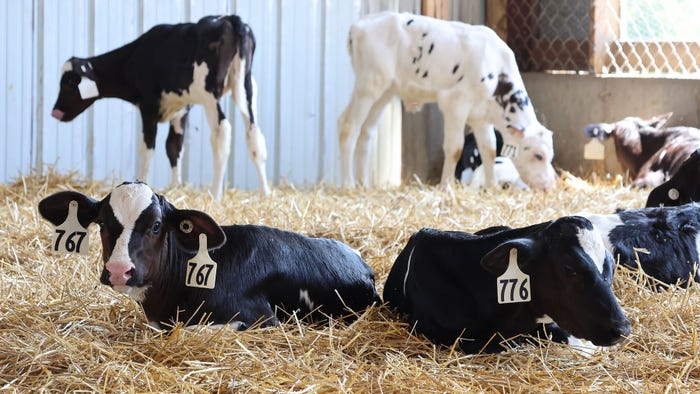
Photos by Mindy Ward
Only miles from the city limits, tucked into the hillside, sits the nearly 700-milk cow operation of Riegel Dairy.
The layout of the Washington, Mo., farm has been the same for generations from the dry cow barn on the hill to the heifer barn below. “It’s the way my grandparents designed it,” co-owner Brian Riegel says.
Sure, the family added structures along the way to house the growing dairy herd, but some of the greatest advancements come from technology. The family incorporated modern technology in the form of feed, software and equipment. “It is helping us remain viable, sustainable,” Riegel adds.
Focus on feed
Riegel finds that overall, reproductive success holds the key to keeping the dairy running smoothly.
“When a cow breeds back on time, she spends more time in the most profitable phase of production — peak lactation,” he says. “To effortlessly achieve early conception takes much planning, months prior to insemination, during the dry period.”
If the cow can transition from dry through early lactation without issue, it sets her up for improved fertility, Riegel notes.
In the dry pen, Riegel Dairy manages the close-up herd by feeding Animate anionic salts and monitoring data for the prevention of transition cow disease and disorders.
Monitor dairy data
Ear tag technology from Select Sires called CowManager Sensor remotely monitors the herd 24/7.
By mindfully managing, Riegel Dairy reaps the benefits of a more successful lactation, Riegel adds. But it isn’t only the cows he is monitoring.
Ear tags also log each time a calf enters the farm’s automatic milk feeder unit. A computer collects data on how much milk is consumed and left within a day.
If a calf goes off milk, Riegel can pull data from the last four days of feeding and look for patterns. He adds that quick access to data allows for an introduction of supportive therapies before introducing antibiotics.
Equipment needs of modern dairy
The family improved the milking parlor to create a low-stress environment.
“We have a quiet milk house now,” Riegel says. With the push of a button, the low-stress entry system allows cows to simply walk in and the gate gently lowers behind them. “We no longer chase cows into the milking parlor,” Riegel says. “They come on their own.”
In the double-24 milking parlor, an automatic teat scrubber not only cleans udders, but also eases milk letdown by the cow. Software monitors cow milk output on a large TV-like monitor in the middle of the pit.
All of the additions of technology and software in the milking barn led to a reduction in employees. It is critical, Riegel says, in a time when labor is hard to find.
Riegel Dairy milks three times per day with a 95-pound bulk tank average and 3.3% to 3.4% butterfat. However, he is looking at technology to help improve his butterfat. Riegel’s goal is lowering bulk tank average to 92 and increasing butterfat to 4%.
The family opened its dairy operation and shared its experiences with fellow farmers during the Missouri Dairy Summer Social in June.
For more details and an inside look at Riegel Dairy, click through the slideshow.
About the Author(s)
You May Also Like






